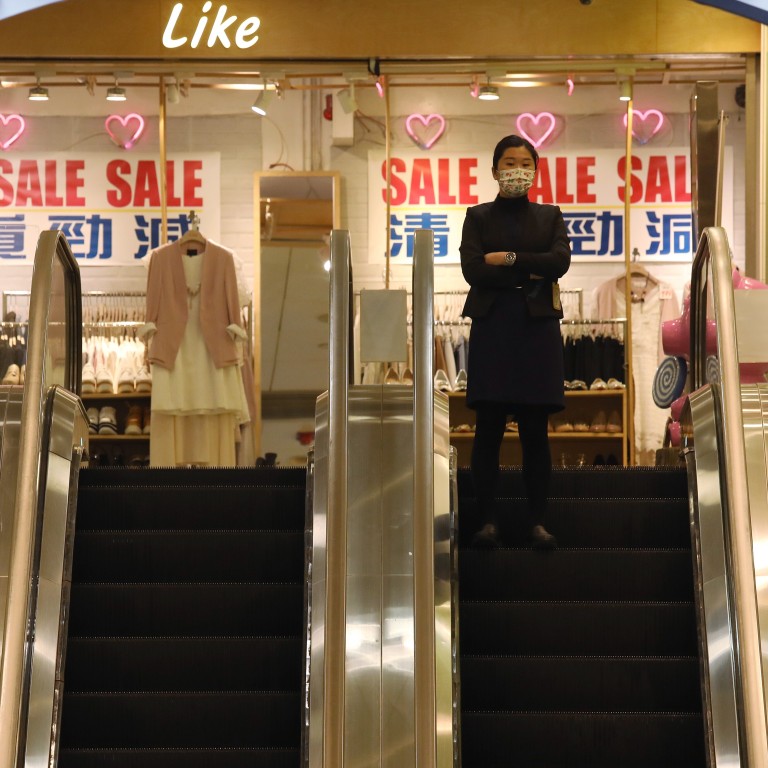
Coronavirus: for Hong Kong’s retailers left reeling from double blow of social unrest and pandemic, pain is proving useful lesson
- Businesses that relied on visitors from mainland China were caught off guard when anti-government protests drove them away
- The Covid-19 pandemic has only further eroded sales, but some firms are adapting to the tough times and making changes that could help them flourish
At the popular G2000 fashion outlet at Jardine's Crescent, spring and summer clothes are selling at a discount, but the place is quiet with just five customers browsing over the course of half an hour.
Company founder Michael Tien Puk-sun said revenue at its 36 outlets had fallen 70 per cent in February against a year ago and the drop widened to 80 per cent in March as the outbreak tightened its grip on the city and people stayed home. Spending by mainland visitors in 2019 accounted for 40 per cent of the company’s business but that figure has sunk to zero.
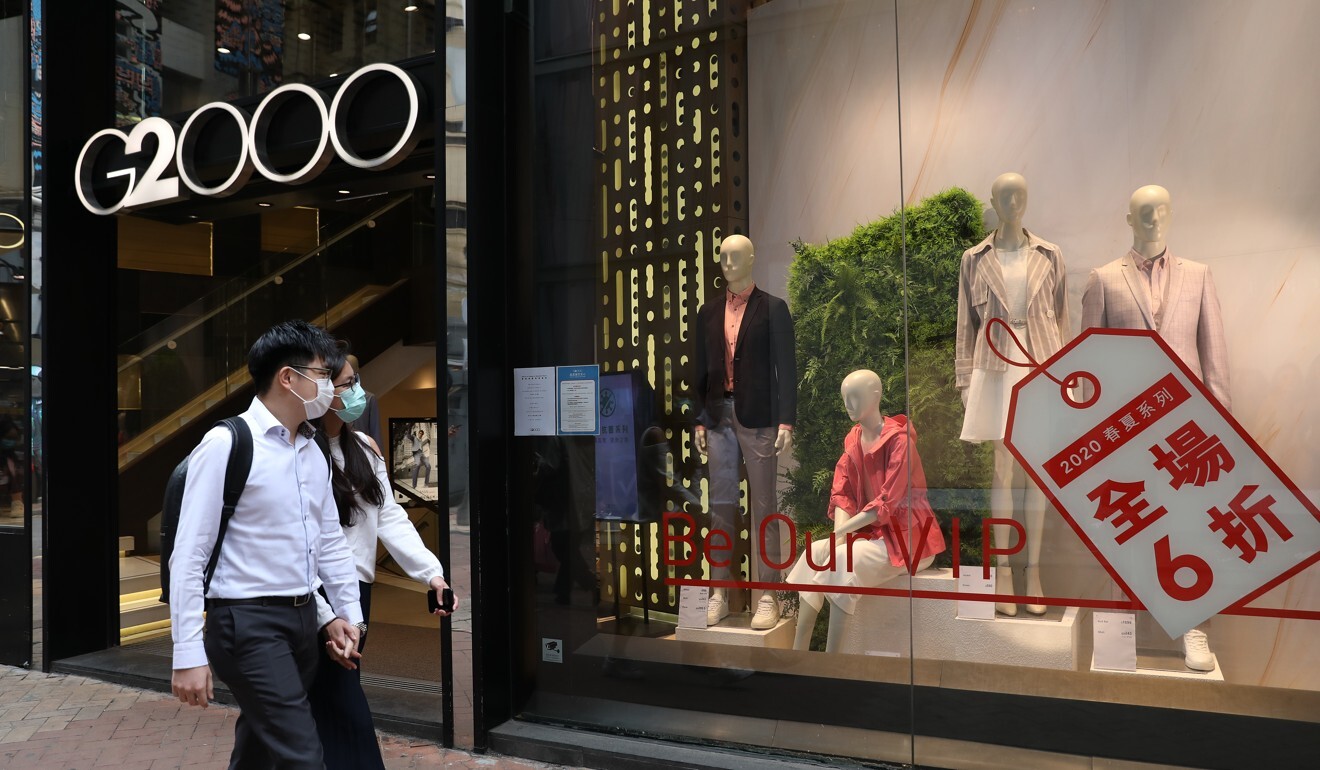
After the outbreak of severe acute respiratory syndrome took a heavy toll on Hong Kong’s economy in 2003, the central government opened the floodgate of mainland visitors with cash to spend.
In the popular shopping district of Tsim Sha Tsui, small fashion shops tout masks and sanitiser at their doors to boost traffic. Along Granville Road, half the shops have been closed.
Even on Canton Road – home to dozens of global brands – sales staff have little to do but chit-chat to pass the time.
Tien, who is also a lawmaker, expects large chains will scale back their physical operations and he will follow suit if landlords refuse to slash rents.
“We have to endure until the lease contracts end. [After that] we will definitely reduce our footprint in Hong Kong,” he said. “Definitely, we will put our emphasis on e-commerce.”
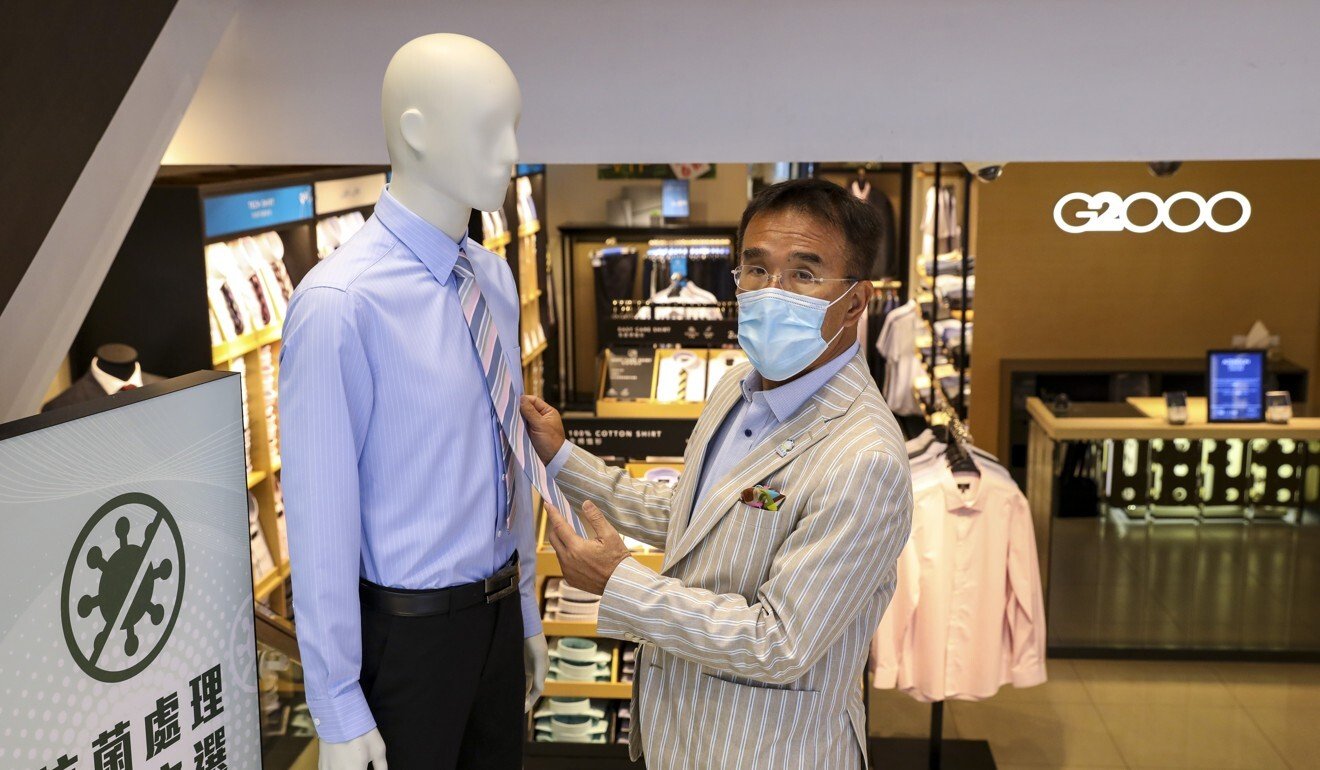
Retailers selling jewellery, watches and apparel were inclined to adopt a similar strategy, according to Hong Kong Retail Management Association chairwoman Annie Tse Yau On-yee. “Everyone wants to exit if they can,” Tse said. “It is just that they are contract bound.”
Citing a recent survey of companies that together ran 2,000 outlets across the city, she said more than 60 per cent had considered shutting down temporarily this month to reduce overhead, while businesses with an online shopping platform had ploughed more effort into them.
Online shopping, once seen as largely unnecessary in such a compact city, is evolving quicker than ever as residents spend their cash online.
In a poll of 1,000 consumers carried out by Market Research firm Ipsos in March, almost half said they were spending more time browsing online.
That embrace of virtual malls helped propel Hong Kong Television Network, which runs the popular HKTV Mall, to a record HK$1.35 billion in orders in the first quarter, double the amount during the same period last year. Food delivery service Foodpanda saw a threefold increase in browsing traffic at its new grocery delivery service, Pandamart, by late March following its launch early February.
Cosmetic giant Bonjour Holding on Wednesday launched a new e-commerce channel to offer discounts through the WeChat mobile application in a bid to snare business on mainland China. To further boost its online footprint, the company plans to launch a shopping channel featuring live broadcasts.
Looking ahead, economist Andy Kwan Cheuk-chiu said big chains with plenty of capital were likely to keep their physical shops open while many medium and small-sized retailers might close during the economic downturn and embrace online sales.
Relying on physical outlets bears a high risk
“Some small brands may expand during the weak market but largely on e-commerce platforms,” he said. “Relying on physical outlets bears a high risk. Once there is a pandemic, then they can’t do business.”
Kwan predicted some firms might shift focus to products that enjoyed a stable demand even during the outbreak such as health care items. But he called for a deeper structural change in the retail sector to correct an overreliance on mainland tourists.
“There will be a rebound but the heyday has gone because for mainlanders, we are wary of them and they also are wary of us,” he said.
Simon Lee Siu-po, co-director of the international business and Chinese enterprise programme at Chinese University, said a robust recovery was unlikely to happen any time soon.
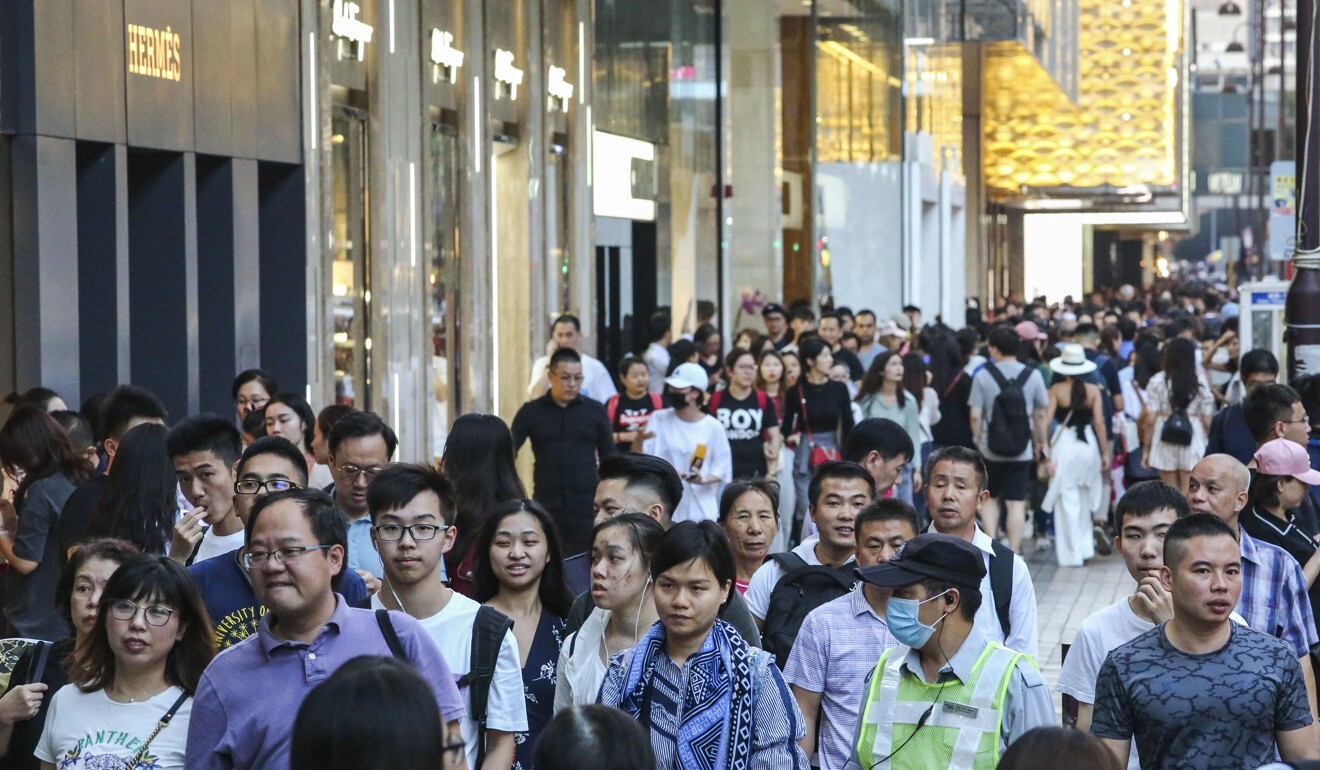
“Developers should save some space for local consumption or local brands,” Lee said. “They know that, but I think the adjustment is not being made fast and big enough … this can help reduce the market fluctuation brought on by [the business decisions] of international brands.”
Companies focusing on Hong Kong customers do appear to be less shaken by the protests and Covid-19 crisis. Rising local brand AbouThai, with 15 stores offering Thai health care and food products, aims to expand its team from about 100 to 150 people between February and June.
CEO Mike Lam King-nam said his business suffered only a small decline during the social unrest, mainly due to it heeding protesters’ calls for strikes.
Revenue surged 30 to 40 per cent in February compared with a few months ago after the company shifted to products in high demand such as masks and hand sanitiser, as well as daily necessities.
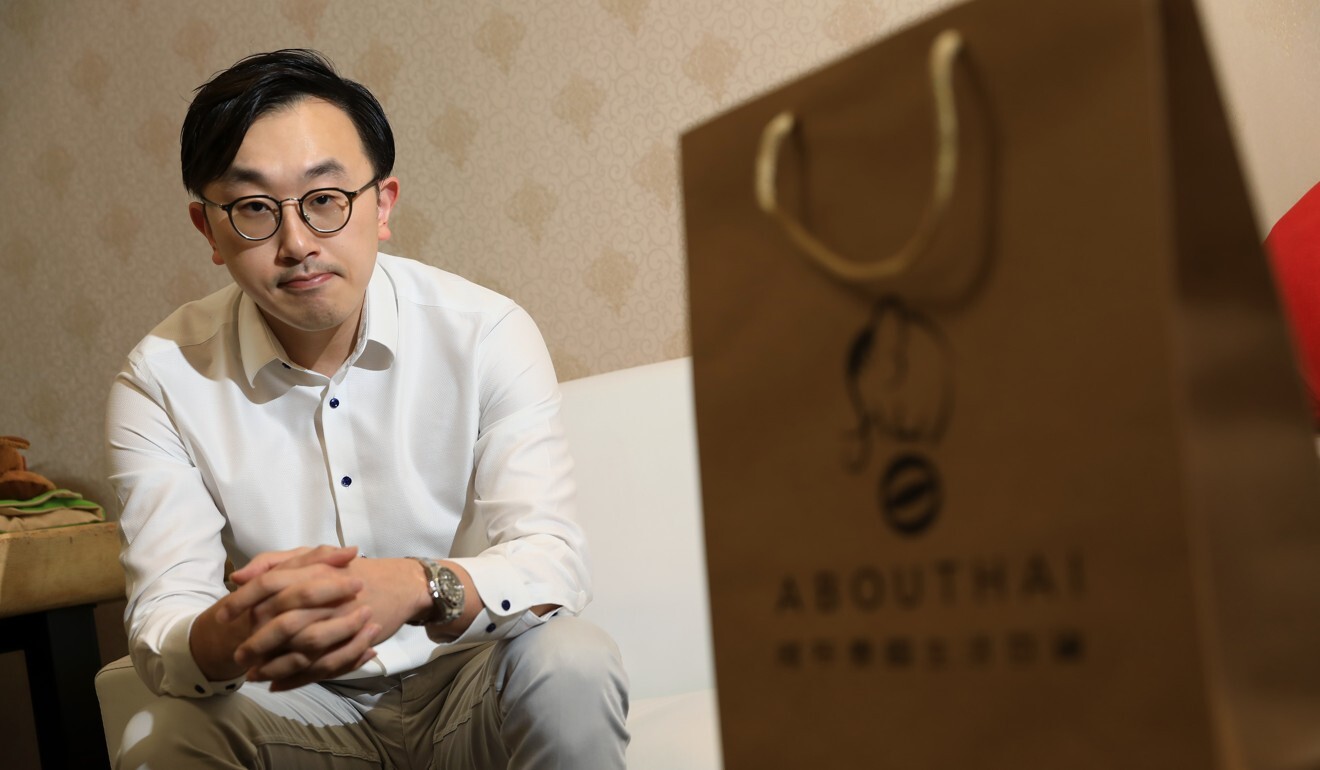
“The change was made immediately,” Lam said, adding online sales grew as well.
Listed beauty product firm Mi Ming Mart is also banking on local sales. Chairwoman Erica Yuen Mi-ming admitted foot traffic had fallen at its 10 outlets but more online orders were now coming in.
Yuen said Hong Kong consumers had high spending power. Adapting to the market during the pandemic, her firm began selling products such as alcohol spray and cordyceps tablets, with plans to roll out more health care supplements.
If I use HK$700,000 for renovation, why don’t I invest the sum in digital marketing?
But she was cautious about adding more physical outlets even though rent is expected to fall sharply.
“On rent, maybe it’s cheap for three years for this contract. After that, they may charge you more. Now it’s not about adding more branches. If I use HK$700,000 for renovation, why don’t I invest the sum in digital marketing?” she said.
Yuen expected the retail landscape to undergo an evolution as opinion leaders used social media channels such as Facebook to build e-commerce platforms, instead of relying on shops for sales, a trend already under way in the beauty product industry in the United States.
“The sales channel will be a big revolution,” she said. “It must become like this within a year. The situation now is a catalyst.”

